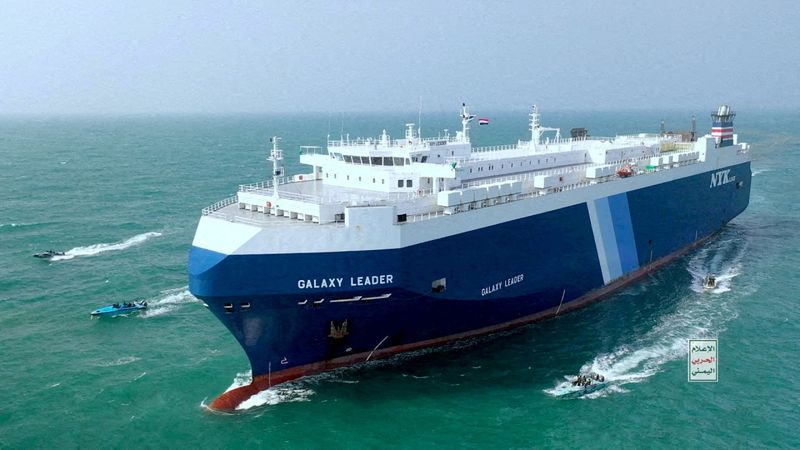By Mark John
(Reuters) - Weeks of attacks by Iranian-backed Houthi militants on vessels in the Red Sea have disrupted shipping in the Suez Canal, the fastest sea route between Asia and Europe, carrying around 15% of global sea trade.
For the European economy, already skirting a mild recession as it tries to shake off high inflation, prolonged trade disruption could derail plans by central banks to start cutting interest rates this year.
Here are some factors policymakers are considering as they assess the implications of the disruptions.
WHAT HAS BEEN THE IMPACT ON THE EUROPEAN ECONOMY SO FAR?
In macroeconomic terms, small to negligible. Germany's Economy Ministry said last week the only noticeable impact on output so far was a few cases of stretched delivery times.
Bank of England chief Andrew Bailey concurred, telling a parliamentary hearing it "hasn't actually had the effect that I sort of feared it might", though uncertainties remained.
No impact from the attacks has yet turned up in Europe's main economic indicators, including December inflation numbers, which ticked up slightly.
That might change - watch Wednesday's preliminary PMI readings for activity in European economies in January, and Feb. 1's first estimate of euro zone inflation for the same month. ECB President Christine Lagarde may well broach the subject at a news conference after Thursday's rate-setting meeting.
WHY ISN'T IT FEEDING THROUGH TO THE ECONOMY YET?
The global economy is still performing below par, suggesting plenty of slack around the system.
Take oil prices, the most obvious channel through which Middle East troubles could hit economies in Europe and beyond.
They haven't taken off yet because, as International Energy Agency executive director Fatih Birol told Reuters last week, supplies are solid and demand growth is slowing.
"I don't expect a major change in the oil price because we have an ample amount of oil coming in the market," he said.
German logistics giant DHL said it still had available air freight capacity - not an option for everyone - because the global economy was "not really pumping yet."
This subdued economic picture makes it harder for companies to pass on any related higher costs to consumers, for example, by having to re-route around Africa. Many of them have rebuilt margins in the past year and accept they might simply have to suck this one up.
Furniture retailer IKEA even said it would stick to planned price cuts and had the stocks to absorb any supply chain shocks.
As long as that remains the case for enough companies, the disruption will not move the dial on consumer price inflation.
CAN EUROPEAN POLICYMAKERS SIMPLY LOOK THROUGH THIS?
No. The longer the disruption goes on, the more it will take a toll on firms and the economy.
U.S. EV-maker Tesla plans to suspend much of its auto production at its German factory from Jan. 29 to Feb. 11 due to a lack of components. Sweden's Volvo halted output at its Belgium plant for three days last month.
The impact is likely more for imports than exports: nearly one quarter of goods coming into Europe travel by sea from Asia while the same route accounts for just 10% of Europe's exports.
Using an IMF estimate of the impact of freight cost rises, Oxford Economics in a Jan. 4 note estimated gains in container transport prices would add 0.6 percentage points to inflation in a year's time. The ECB is expecting euro zone inflation to fall from 5.4% in 2023 to 2.7% this year.
"While this suggests that a sustained closure of the Red Sea wouldn't prevent inflation from falling, it would slow the speed at which it returns to normal," Oxford Economics said.
It did not see this preventing an expected pivot to lower interest rates, however.

In the longer term, the situation may encourage companies to advance plans - drawn up after the COVID-19 pandemic disrupted trade - for alternative, more predictable supply routes.
That could involve longer but more secure trade paths and "near-shoring" or "re-shoring" to bring production closer to key markets. But whatever options are explored, the likelihood is that they all have one thing in common - higher costs.
(Writing and reporting by Mark John; additional reporting by Philip Blenkinsop in Brussels; Graphic by Leigh Thomas in Paris; Editing by Bernadette Baum)